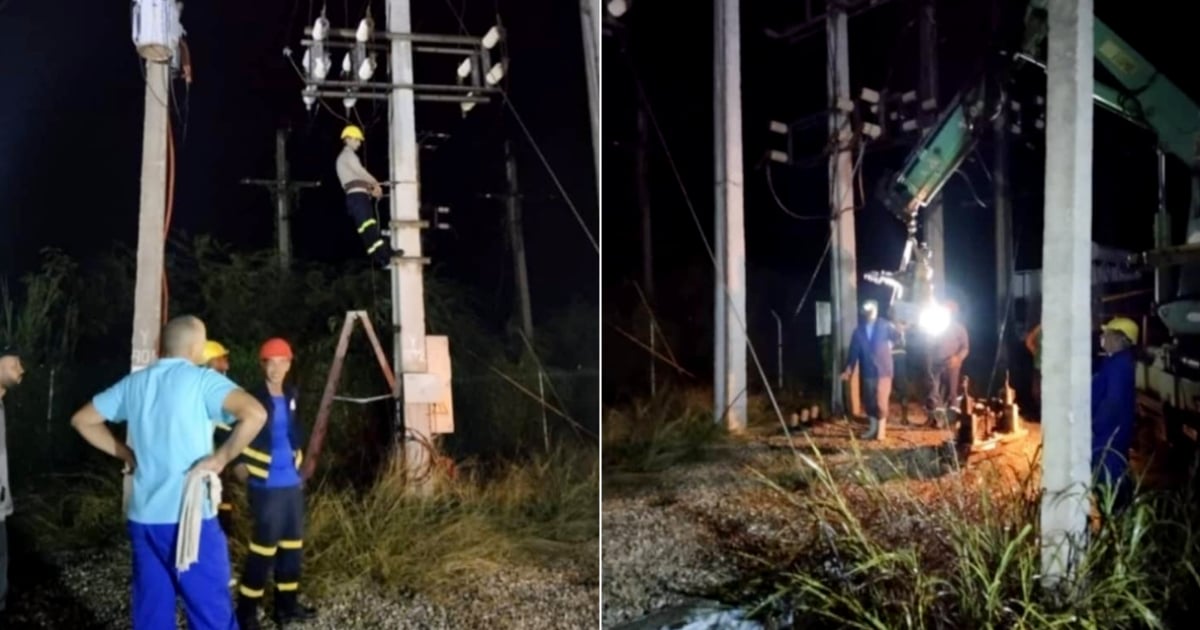
It seems like the headline of a meme or a parody of news from Cuba's Electric Union (UNE), but this is what actually happened this Saturday in three municipalities of Ciego de Ávila, according to the Electric Company of that province.
"The Jicotea, Majagua, Orlando González circuit is without electricity service to remove the tiñosa at the Substation. It is urged to keep the equipment disconnected to avoid damage," reported the Electric Company of Ciego de Ávila on Telegram.
In its infinite and macabre creativity, the Cuban regime has just unlocked a new excuse to justify the blackouts on the Island. Starting Saturday, "removing tiñosa at the substation" will serve for those responsible for the electricity supply in the country to evade addressing the causes of the collapse of the national electric power system (SEN).
Recently, Cuban authorities have used the supposed theft of oil from electrical transformers to justify the extensive blackouts that the population experiences every day.
A report from Canal Caribe stated in mid-September that the theft of the lubricant causes considerable damage to the infrastructure and prolonged outages in the service, leaving neighborhoods and communities without electricity, sometimes for more than 24 hours.
"When it occurs in substations and the oil is stolen from a 4,000 KVA transformer, it causes around 5,000 customers to be left without service," said Israel Ramos, a specialist at UNE.
The alleged thefts of dielectric oil started in equipment at electrical substations, but those responsible at UNE are already reporting them in distribution transformers that are on columns and poles.
"The events that have been occurring recently have caused the reserve to decrease, and we no longer have backup transformers," emphasized Ramos.
In those cases, options in other provinces must be sought, which delays the solution, while customers remain without service. "Last week in the town of Zulueta, in Villa Clara, they were without service for about three days," he added.
Last June, authorities from the entity reported the phenomenon as one of the factors that further complicates the energy situation in Cuba.
For their part, the Cubans are tired of hearing excuses and pretexts to mask the regime's inefficiency. This is evident in the comments and criticisms that thousands of users express on the social media of UNE and the provincial electric companies.
"This is a constant psychological distress, and to make matters worse, one lie after another, no one is providing a solution to these problems that worsen every day," expressed an internet user in mid-July. Comments like theirs appear daily on social media.
In September 2023, the director of the Electric Company of Havana, Mario Castillo Salas, reported that at least 25 circuits in the capital were triggered during a storm.
"The persistence of the rain in several municipalities limits restoration work," added the post, which received dozens of comments from users who claimed that the storm was the perfect excuse for new blackouts.
In February of that year, after the fourth massive blackout reported in just nine days around that time, Cuban users erupted. Between "wildfires" and "human errors," the SEN suffered one of the most notable collapses in recent times.
"How can they be so cynical, liars, manipulators (...). Please be more creative, come up with a better lie," commented an outraged internet user. "It's simple, this political system doesn't work, the same leaders know it and are aware of it, but they don't care," added another.
Editor’s Note: Initially, this information was published with an erroneous headline, stating that the events occurred in Sancti Spíritus, instead of the province of Ciego de Ávila. Thanks to a reader's observation, this mistake was corrected. CiberCuba apologizes for the error in the headline.What do you think?
SEE COMMENTS (2)Filed under: